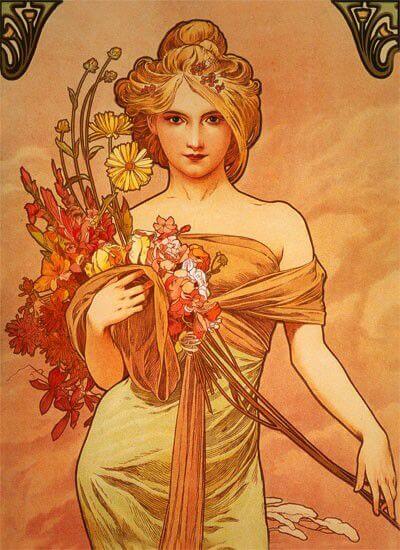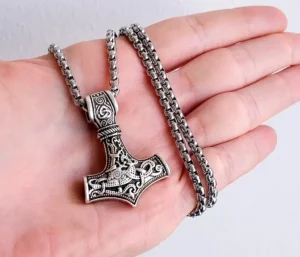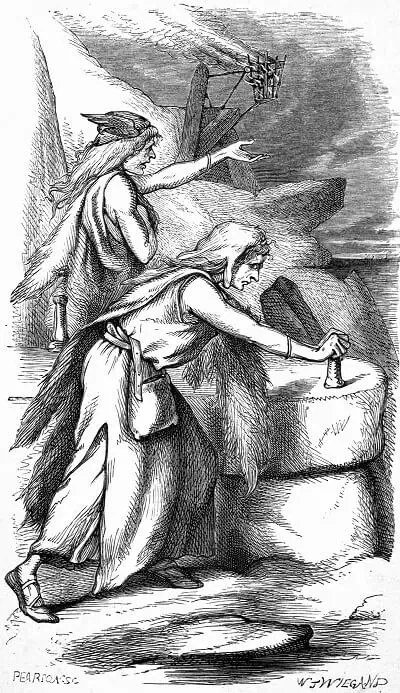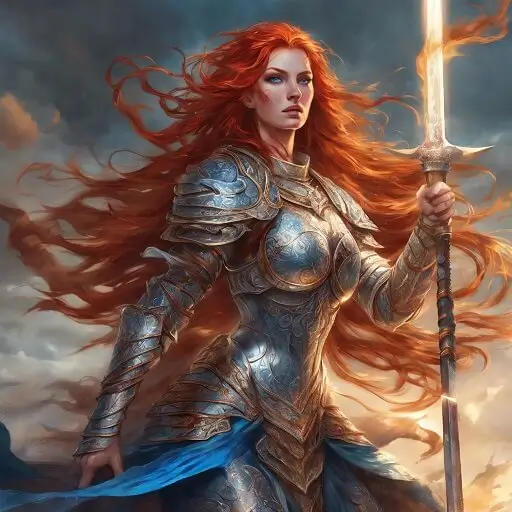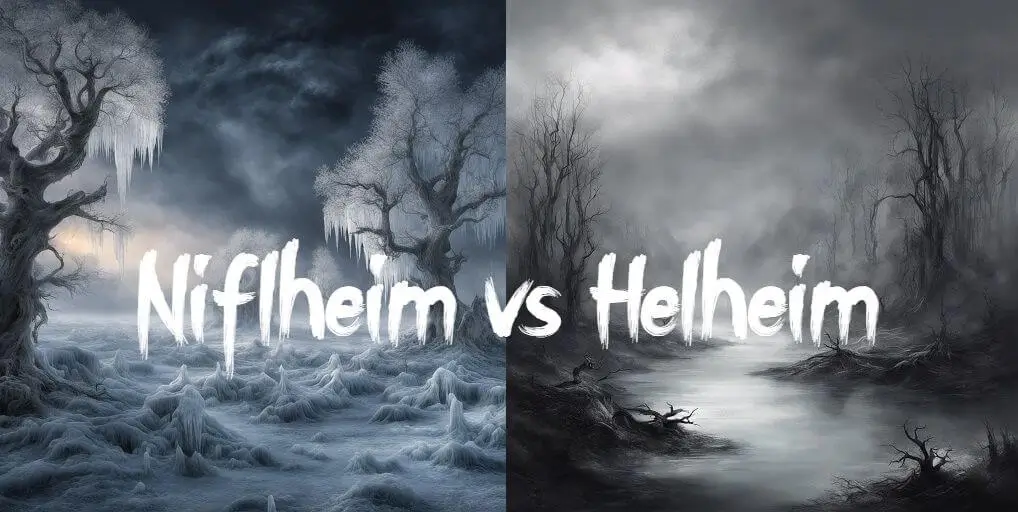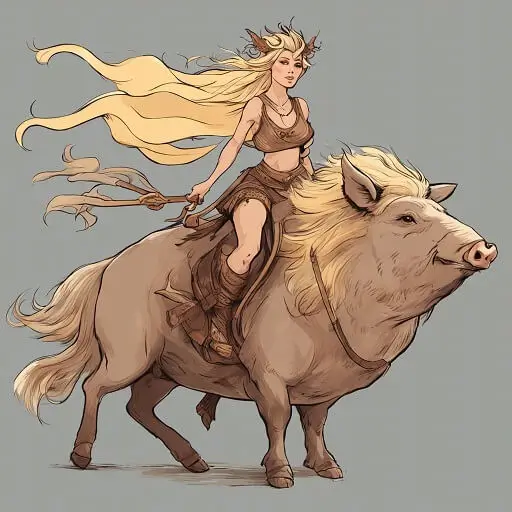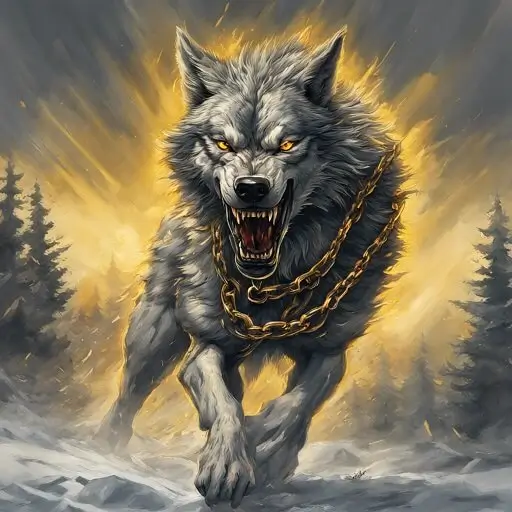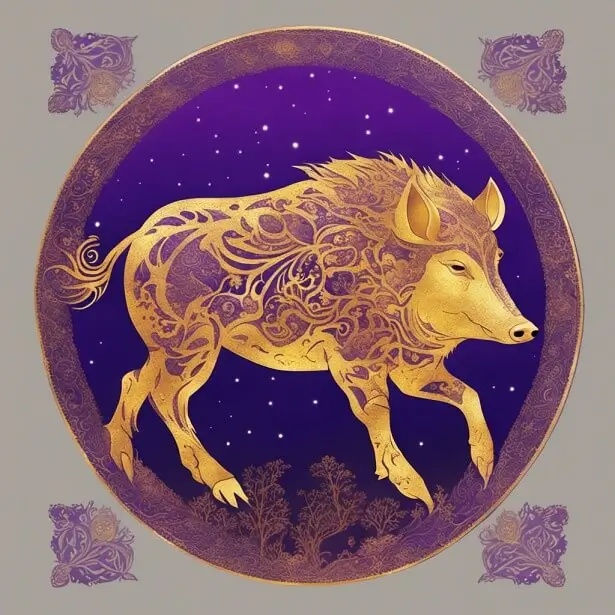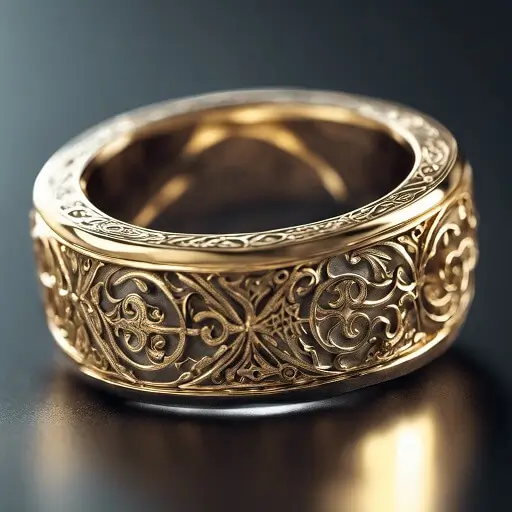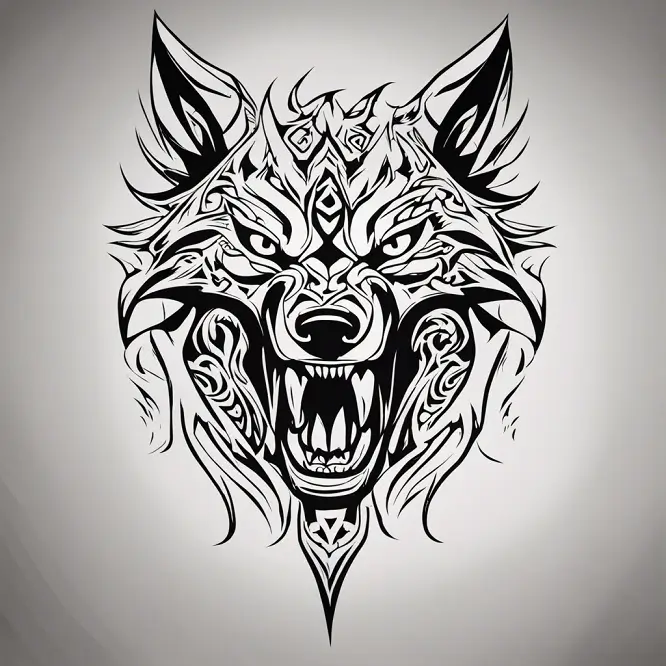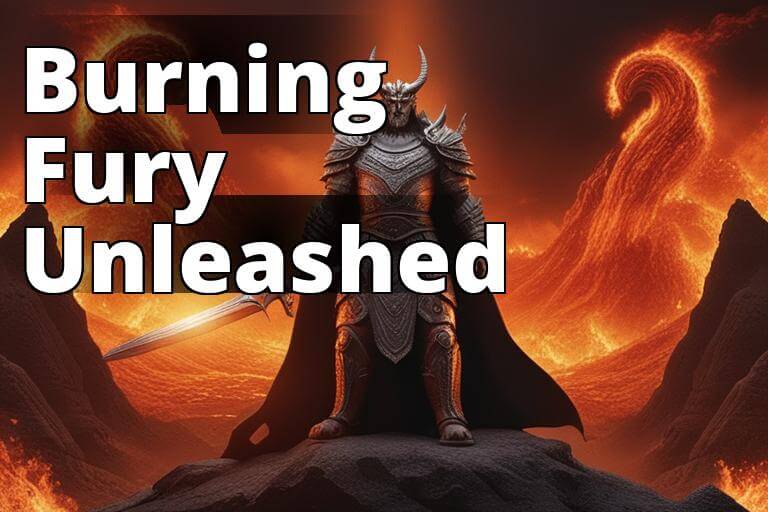Welcome to our exploration of Lofn, the enigmatic Goddess of Forbidden Love in Norse mythology. In the vast realm of Norse deities, Lofn stands as a lesser-known figure with a significant role in the intricate tapestry of love and relationships.
Throughout Norse culture, love held great importance, and Lofn’s presence adds depth to the complexities of these emotions. As we delve into Lofn’s origins, attributes, and mythological stories, we’ll uncover her role in facilitating forbidden love and securing harmonious unions.
Who is Lofn?
Lofn is a lesser-known Norse goddess who holds a unique role in the realm of Norse mythology. Often overshadowed by more prominent deities, Lofn’s significance lies in her association with forbidden love and her role as a facilitator and protector of such relationships. While her name may not be as widely recognized as others, her presence adds depth to the complexities of love within Norse mythos.
The origins and genealogy of Lofn are not extensively documented in Norse mythology. However, she is believed to be one of the lesser-known Aesir goddesses, a divine family that includes deities like Odin, Thor, and Freya. Lofn’s lineage and her exact place within the pantheon remain subject to interpretation and speculation.
In Norse literature, Lofn’s presence is often associated with narratives involving unconventional love stories or instances where individuals seek her assistance in overcoming obstacles that stand in the way of their love. Her portrayal embodies the idea that love should not be confined by societal restrictions or norms, and that it transcends boundaries and obstacles.
Lofn’s Role and Attributes
Lofn as the Goddess of Forbidden Love
Forbidden love holds a significant place in Norse mythology, characterized by the tension and obstacles that arise from love affairs deemed socially or morally unacceptable. Norse society placed great importance on marriage alliances, familial ties, and societal norms, often imposing restrictions on romantic relationships.
However, Norse mythology recognizes that love is a powerful force that cannot always be contained within these boundaries. The concept of forbidden love emerges from the clash between societal expectations and the deep emotional connections formed outside of those constraints.
Lofn’s Role in Facilitating and Protecting Such Relationships
Lofn, as the Goddess of Forbidden Love, plays a crucial role in facilitating and protecting relationships that defy societal norms. She acts as a compassionate mediator and advocate for individuals whose love transcends the boundaries set by Norse society.
Lofn is believed to possess the ability to sway the hearts and minds of both gods and humans, invoking understanding and empathy in those who stand in opposition to forbidden unions. Her intervention often allows couples to overcome societal barriers, secure consent, and find acceptance for their love.
As a protector of forbidden love, Lofn shields these relationships from the consequences of societal disapproval and external threats. She offers solace and support to individuals who face challenges, providing them with the strength and courage to pursue their heartfelt connections despite the odds.
Lofn’s role in facilitating and protecting forbidden love signifies the acknowledgment of the complexities of human emotions and the belief that love should not be constrained by societal norms. Her presence highlights the importance of understanding and compassion in navigating relationships that defy expectations, offering hope and support to those who find themselves entangled in the web of forbidden love.
Lofn’s Association with Marriage and Consent
Lofn’s Role in Securing Permission for Marriage
Despite her lesser-known status, she holds an important role in Norse mythology when it comes to securing permission for marriage. In Norse culture, obtaining consent from both parties involved in a union was vital to ensuring a harmonious and blessed marriage.
As the Goddess of Forbidden Love, she intercedes on behalf of couples seeking to wed, particularly in cases where obstacles or familial disapproval arise. Her influence and persuasive abilities enable her to sway the hearts and minds of those who hold power over the marital decision, ensuring that consent is granted and the union can proceed.
Lofn’s intervention emphasizes the significance of consent in Norse marriages, highlighting the respect for individual agency and the belief that love should not be stifled by external forces. Her role in securing permission serves as a reminder of the importance of mutual agreement and harmony in the formation of marital bonds.
Understanding Lofn’s Role in Facilitating Harmonious Unions
Lofn’s association with facilitating harmonious unions extends beyond her role in securing permission for marriage. As the Goddess of Forbidden Love, she seeks to bring together couples who genuinely love each other, even if their union challenges societal expectations.
Lofn’s presence embodies the idea that love should be based on genuine affection and shared values rather than external factors such as social status or alliances. She fosters an understanding of the importance of emotional compatibility and mutual respect in establishing long-lasting and fulfilling relationships.
By facilitating harmonious unions, she promotes the idea that love should transcend societal constraints and be grounded in a deep connection between individuals. Her role serves as a reminder that true happiness in a marriage stems from the shared bond and understanding between partners, rather than external influences.
Attestations
In the rich tapestry of Norse mythology, Lofn, the goddess of forbidden love, made her appearance in the illustrious Prose Edda Gylfaginning, Chapter 35 of this renowned text listed sixteen goddesses within the pantheon, with Lofn occupying the eighth position.
She is described as gracious and kindly to those who call upon her, capable of obtaining permission from Allfather or Frigg for the union of men and women in marriage, even when it was previously forbidden or denied. The permission granted by Lofn is referred to as “leave,” and she is highly esteemed and loved by people for her role in facilitating marriages. Her name, derived from the word “lof,” encompassed the meanings of permission and high praise.
Lofn’s influence extended beyond prose and found its way into Skaldic poems, where she appeared as a kenning for “woman.” Kenning, a creative device utilized by ancient Norse writers, allowed them to allude to a trait or characteristic of something without directly naming it. Much like referring to the mighty Thor as the “Hammer wielder,” Lofn became synonymous with the essence of womanhood.
Thor’s hammer aka Mjolnir
Scholars suggest that Lofn would bless couples who sought to be together, aiding them in overcoming familial disapproval and facilitating their union. While she couldn’t change the opinions of others, her intervention worked to open hearts and minds, making others more receptive to accepting these forbidden love affairs.
Within the pantheon, Lofn stood alongside other goddesses of love in Norse mythology. Frigg, the queen of Asgard, presided over official love, marriage, and beauty. Freya, the princess of Vanaheim, ruled over unofficial love and war. Lofn, in contrast, embodied the essence of forbidden love, presenting herself as a risk-taker, rule-breaker, and a goddess who wagered on the desires and relationships of others.
Intriguing and enigmatic, Lofn’s role as the goddess of forbidden love adds depth and complexity to the realm of Norse mythology, illustrating the intricate dynamics of love in all its forms.
Gods and Goddesses Associated with Love and Marriage
Norse mythology features several prominent gods and goddesses associated with love, relationships, and marriage. These deities played crucial roles in shaping the romantic and familial dynamics of both humans and divine beings. Some of the notable figures include:
- Freya: The goddess of love, beauty, fertility, and war. Freya was known for her captivating allure, and she possessed the ability to grant love and passion to individuals. She was also associated with marriage and desire.
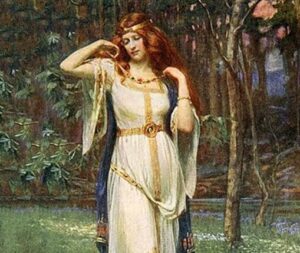
Freya
- Freyr: The god of fertility, prosperity, and sacred kingship. Freyr was often invoked to bless marriages, ensure bountiful harvests, and foster harmony in relationships. He was particularly revered for his role in facilitating fertile unions.
- Frigg: The queen of Asgard, wife of Odin, and goddess of marriage, motherhood, and destiny. Frigg was a protector of married couples and families. She possessed knowledge of fate and played a significant role in shaping the destinies of individuals.
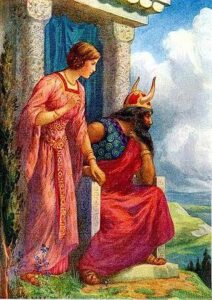
Frigg with Odin
- Thor: The mighty god of thunder, protection, and fertility. While Thor is often associated with strength and battle, he was also seen as a defender of marriages and families. Thor was believed to protect couples from harm and ward off malevolent forces.
- Njord: The god of the sea, wealth, commerce, and marriages between different tribes or clans. Njord presided over marriages that sought to unite different communities, fostering alliances and peaceful coexistence.
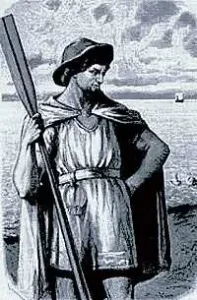
Njord
FAQ
Is Lofn considered a mischievous or rebellious goddess?
While Lofn is associated with facilitating forbidden love, she is not typically portrayed as mischievous or rebellious. Instead, she is depicted as a compassionate mediator, advocating for love and striving to overcome societal barriers. Her role is more focused on granting permission and fostering understanding rather than actively challenging established norms.
How does Lofn differ from other goddesses of love in Norse mythology?
She stands apart from other goddesses of love in Norse mythology due to her association with forbidden love. While Frigg represents official love and marriage, and Freya embodies unofficial love and war, Lofn specifically facilitates unions that defy societal norms and expectations. She serves as a symbol of hope for individuals involved in relationships considered forbidden or disapproved of by others.
Can Lofn change the minds of those who disapprove of forbidden love?
Lofn’s primary role is to facilitate and protect forbidden love, but she does not possess the power to forcefully change the minds of others. Instead, she works to open hearts and minds, encouraging acceptance and understanding. Lofn’s influence aims to create a more favorable environment for the couple seeking love, but ultimately, it is up to individuals and their families to decide whether to embrace or reject such relationships.
Are there similar figures in other mythologies that parallel the role of Lofn in Norse mythology?
Yes, various mythologies have figures that share similarities with Lofn in terms of facilitating and protecting forbidden or unconventional love. In Greek mythology, Eros (Cupid) and Psyche embody a forbidden love story, where Eros defies societal norms to be with Psyche. In Hindu mythology, Kamadeva is the god of love and desire, often associated with forbidden or unconventional relationships. These figures, like Lofn, represent the complexities and challenges of love that transcend societal boundaries in different cultural contexts.

